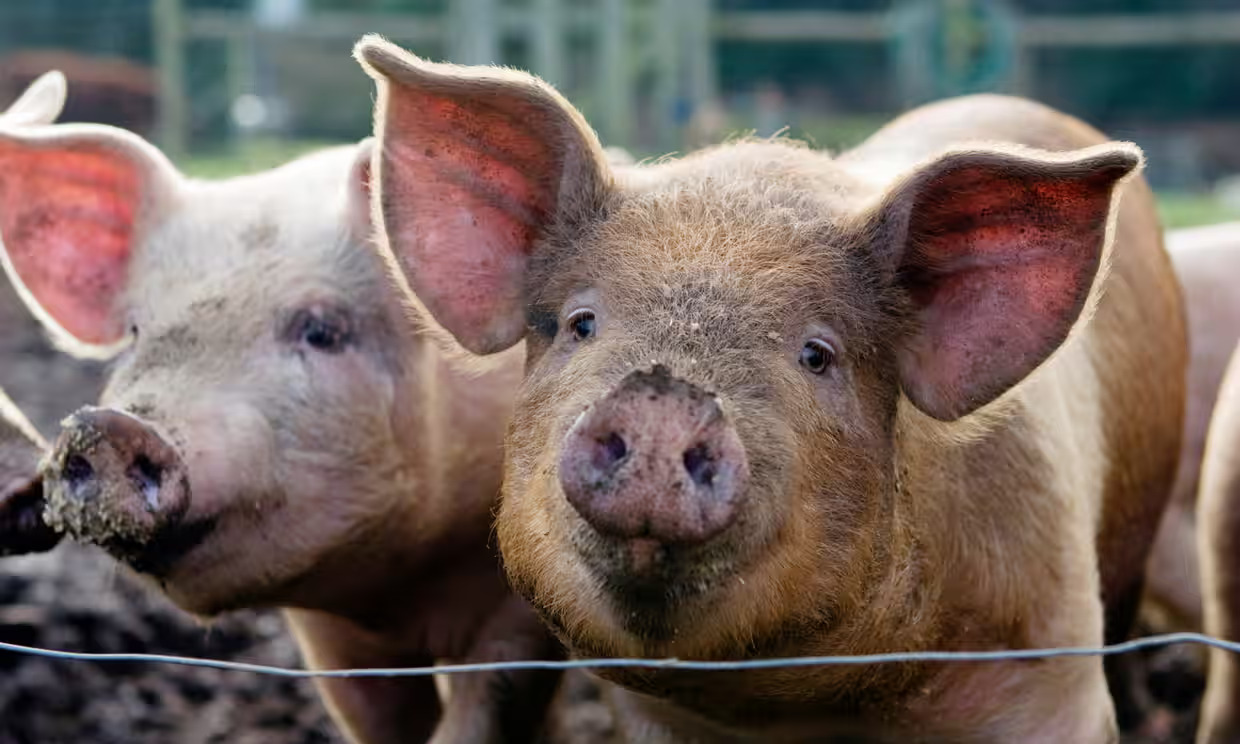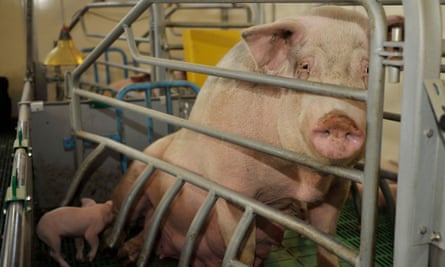A proposed federal law would wipe out existing state laws that prevent farm animal brutality and the spread of disease.
 In 2016 Massachusetts voters required their farmers to give chickens, pigs and calves enough room to stand up, lie down, extend their limbs and turn around freely. Photograph: Charity Burggraaf/Getty Images
In 2016 Massachusetts voters required their farmers to give chickens, pigs and calves enough room to stand up, lie down, extend their limbs and turn around freely. Photograph: Charity Burggraaf/Getty Images
–
Supported by
–
Many animals raised for meat in the US spend their lives in spaces barely bigger than their own bodies. Pregnant pigs are held in gestation crates so small they can only sit, stand or lie down in them. Chickens are packed into battery cages so crowded they often can’t extend their wings. And calves raised for veal are packed into crates without enough room to turn around
While these conditions are part of what makes factory-farmed meat so cheap in the US, a growing number of consumers are rejecting these brutal practices, with more than a dozen states even enacting their own laws to ban them. But a new proposal in Congress would reverse these advances in animal welfare, threatening to upend years of work – and victories – by animal rights activists, farmers and food safety advocates.
The Republican-led Ending Agricultural Trade Suppression, or Eats, Act aims to end the authority of states and localities to set animal welfare and food safety standards. If passed, it could also jeopardize more than 1,000 state and local health and safety laws that set food-quality requirements and stop the spread of invasive species and zoonotic diseases like avian flu. Experts say that legislation this extreme would ordinarily be unlikely to pass, but its supporters are pushing the Eats Act as part of this year’s critical package of agriculture policies known as the farm bill, so there’s a greater possibility of it becoming law.
“There’s a longstanding precedent for states to legislate, to protect animals and to protect public health,” said Alicia Prygoski, the legislative affairs manager at the Animal Legal Defense Fund (ALDF). “Congress shouldn’t be destroying that. We should allow states to do what is in the best interest of their own residents.”
–
There are no federal laws or standards for the treatment of farmed animals, so it’s been up to states to create laws that protect animals. Massachusetts, for example, passed a law in 2016 that banned extreme confinement of farmed animals. In a public referendum, nearly 80% of voters approved a law banning the sale of meat or eggs from animals held in confined spaces, and legally required farmers in the state to give chickens, pigs and calves enough room to stand up, lie down, extend their limbs and turn around freely.
These regulations also prevent the spread of zoonotic diseases and support small-scale farmers who raise meat in a sustainable way. In addition to Massachusetts, 15 other states, including California, Arizona and New Jersey, have implemented similar bans that the Eats Act would undo. If the Eats Act were to pass, it essentially would mean “anything goes” when it comes to regulating animal agriculture.
It’s just the latest effort by supporters of big agriculture to dismantle animal welfare regulations, experts say. Since California passed Proposition 12, which bans the sale of meat and eggs made from animals held in extreme confinement (including from animals raised in other states), the pork industry in particular has sought to overturn it. Last year the US supreme court agreed to hear the challenge – which argued that the ban unfairly affects farmers in other states who want to sell their meat in California – but ultimately upheld the constitutionality of California’s law.
–
After that defeat, groups like the National Pork Producers Council have turned their support to the Eats Act, which, if passed, would also invalidate Proposition 12.
“NPPC supports finding a legislative solution, like the Eats Act, to Proposition 12 to prevent state and local governments from interfering with the production of agricultural products in other states,” the NPPC said in a public statement.
Supporters also say laws regulating food production will drive up the cost of meat and eggs. By eliminating them, they argue, food will stay affordable. The National Pork Producers Council did not respond to requests for comment.
The bill would leave states without the power to implement their own laws beyond federal regulation, said Kara Shannon, the director of farm animal welfare policy at the American Society for the Prevention of Cruelty to Animals (ASPCA), which is leading a coalition opposing the Eats Act. “There’s nothing to protect these animals on farms, or even just slightly improve their lives.”
–
There’s nothing to protect these animals on farms, or even just slightly improve their lives
–
The Eats Act would also jeopardize animal welfare laws protecting horses from slaughter, as well as those banning wildlife trafficking and puppy mills.
In addition to animal welfare, the bill would also weaken protections for public health. Most states currently require pre-entry inspection and disease control measures for farm animals entering the state. In Iowa, for example, no animal that “is infected with or has been recently exposed to a disease can enter the state”. These measures were designed not only to protect animals, but also farmers from the devastating effects of zoonotic disease spread.
–
The Eats Act would undermine farmers and businesses that treat animals humanely, said Chris Oliviero, the general manager of Niman Ranch, a network of more than 700 family farmers and ranchers across the country.
“We believe if you take care of a farmer, who in turn can take better care of the animal and allow them to exhibit natural behaviors, you can produce a better-tasting meat that aligns with what consumers truly think of when they feel that they’re purchasing a higher attribute,” Oliviero said.
In August, more than 150 bipartisan House lawmakers signed a letter urging the House agriculture committee not to include the Eats Act in the 2023 farm bill. A group of 30 US senators signed a similar letter rejecting the Eats Act.
“The Eats Act would harm America’s small farmers and infringe on the fundamental rights of states to establish laws and regulations within their own borders,” the letter said.
–
Explore more on these topics
- –
- –
- –
- –
- –















